#picard meta
Text
Some thoughts on Picard Season 2 and why it's unpopular.
So I had a bit of an epiphany yesterday. I'm rewatching Picard Season 2 in preparation for a discussion about it with a colleague next week and I was constantly reminded that a lot of fans are very visceral in their dislike of this season.
To be honest, there are parts of it that I don't like. I think the whole Soong/Kore story was a totally unnecessary distraction and was only done, once again to shoehorn in Brent Spiner and the Picard/Data relationship - which I never found compelling in the first place. But that's just me.
However, I realized that Picard Season 2 does something that no other season (or show) of Star Trek does, it centers the entire narrative on humanity. By making the protagonists AND the antagonists humans, there is no subtle (or not so subtle) use of alienation to map contemporary adversaries or conflicts onto the Federation's adversaries. This is important, because, as I have argued in a multitude of research papers, Star Trek is very, very guilty of framing future conflicts through the lens of contemporary adversaries. This was done very explicitly in TOS - both Roddenberry and Coon overtly asked for the Klingons to be modeled on an "Asiatic Communist" trope. Communism was again the enemy in TNG, through the medium of the Borg and "assimilation" and loss of individuality. DS9 has its Cardassian "Nazis"; Voyager and Enterprise the chaotic post-Cold War existential threat of non-state actors and by the time we get to Discovery, the Klingons have been recast as Jihadist extremists.
The fundamental problem with this is that no matter how much Star Trek might talk about the Federation being a "future better us"; by casting recognizable real world adversaries as the Federation's foes, it automatically casts the contemporary US as the Federation (that's just how TV works, especially through the manichean lens of US culture).
So, if you don't want to think too hard about the ways in which the US interacts with the world. If you don't want to think too hard about American exceptionalism and Neo-imperialism and the misuse of force (and capital) without and within the US. If you cloak it all in the surface progressiveness of visible diversity - and I'm not claiming that diversity and representation isn't important, of course it is, but diversity does not equal progressive politics - then you can happily watch Star Trek without ever having to grapple with the uglier parts of the American experience. If we are the Federation, and clearly we must be because the Federation's foes are recognizably our foes, then we are already the galaxy's "good guys"; the Federation is just a future extension of the American now.
Season 2 of Picard blows that all apart. The bad guys are the Confederation and, by going back to the 21st century and exposing the roots of the Confederation in all the ugly, racist, greedy, unequal, venal, corrupt layers of 21st century America, the Confederation is a direct consequence of that present (our present) being allowed to play out into the future. We are the enemy in the 21st century and we become the enemy in the 24th century.
And the show pulls absolutely no punches. We get ICE brutalizing detainees and explicit discussions of people being disappeared because they are dehumanized as "non-people". Homeless encampments and immigrant clinics amid glittering towers and sumptuous parties. We get quips about the ridiculousness of pledging allegiance to a flag (thank you Ríos) and monologues about exchanging white hoods for suits (thank you Guinan). Some of the despair is directed to the behaviors of everyone on the planet - climate change - but the vast majority of the political commentary is explicitly about the contemporary US.
Not only that but it's done by a diverse cast that speaks Spanish, and is brown and queer and female and empowered (thank you Queen Agnes) and where the only white men are aging and feeble.
It is (the wandering Soong/Kore storyline notwithstanding) fucking brilliant television and it's the first time that Star Trek is ever explicitly - textually AND subtextually - progressive. There is no ability for the audience to elide the message by hiding in the fiction that we are the Federation and THEY are the bad guys (the Klingons, the Borg, the Romulans, the Breen, the Cardassians).
So no, let's get rid of the bullshit that people don't like Picard Season 2 because of "the writing", the writers room for Seasons 2 and 3 is almost identical (Matalas, Appel, Monfette, Maggs and Okomura) and the writing for both seasons was taking place almost at the same time.
Whether it's subconscious or not, the disproportionate degree of hate leveled at Season 2 (often by the same fans that love season 3 for it's "great writing" and overt nostalgia) exists because the storytelling in Season 2 leaves fans no place to hide. Because for the first time Star Trek really dives into the core of science fiction, which, as many, many sci-fi writers have explained (Margaret Atwood most recently), is not to predict the future but to critique the present.
I may come back and edit or extend this later, but right now I'm going to leave it as is and post.
Edited to clarify that you can hate Season 2 for any reason you want to, personal taste is just that, personal - but the (for the first time) explicit social commentary cannot be divorced from the unusual levels of vitriol hurled at this season by a substantial group of very vocal fans.
48 notes
·
View notes
Note
Agnes and Narek have a lot in common: both were brainwashed at some point and both tried to kill their lover, only one managed to do it. I wish to read more fanfics about those two because I can feel a connexion. Agnes ultimate choice with the borg queen is interesting in this perspective. She started as being fascinated with Android life, her meeting with Oh let her full of fear and she finally made peace while I can't see Narek doing the same.
Oh, hello ask that didn't ping me! My apologies for taking so long to reply!
I adore Agnes's arc and how it runs roughly parallel to Narek for that whole season.
I think Agnes has a really deep, fundamental love for life as an abstract concept. Her career is all about identifying and refining and recreating that spark. After Oh shows her the vision, all her actions are taken because she thinks she's protecting life. She even kills Bruce thinking it's the only way to help and regrets it so deeply that it is almost as effective in breaking her as the vision was.
I think where Jurati and Narek diverge (and where he writes his own bad ending) is when they were both confronted with Soji and the reality of her. Agnes can barely contain her adoration because Soji is the realization of Bruce and her livelong dreams. Unlike Agnes, Narek's fears are what he's had his whole life, and his love for Soji is an inversion of his beliefs.
They both desperately want to protect life, they just come from very different initial definitions of what constitutes "life".
Agnes's Season 2 arc is a truly lovely continuiation of this and an extension of her trauma for killing Bruce. She's alone in a great many ways, particularly in her beliefs about life. (I wish Soji had been in that season longer, Agnes seemed to have a closer relationship to her than anyone else.)
I think her decision with the Borg Queen was logical from Agnes's perspective. Not because she was their ticket home, even though that was certainly part of the excuse, but because it was a way to save a life, and to take a life without actually killing the Queen. Jurati knows all about the Borg, but while she has healthy respect for the dangers involved, she has a view on the Borg that is much more aligned with Soji than anyone else. For all the fear that Picard and Seven have about the Borg Queen, Jurati looks at her and sees a life, not a monster.
(Picard stumbles a bit here, because they cannot be arsed to go into detail about the Borg when they are racing through the season in as few episodes as possible. Such is life and the wasted potential in this show.)
Agnes taking the queen on is so very interesting, too, because she is clearly depressed and disillusioned, adrift, and should be an easy target. She isn't though, and despite having the Queen in her head directly, it takes a phenomenally long time for her to lose control of herself. Even when she does, it's not total, she effects the Queen as much as she is affected. It makes me wish they didn't retcon Seasons 1 and 2 in the third season, truly, because it would be so fascinating to see the Borg--effectively a plague that spreads across the galaxy--but with Agnes's respect for life hardcoded into them.
How cool would it have been to have Borg in Starfleet. Would they be individuals linked to the hive mind? Agnes wouldn't have been down for total subjagation. Would they have retained themselves despite being integrated in? Would they be the new medical core? (Would they have been like Legion (Mass Effect) and one mind made of many?) Would every ship have one Borg assigned and would they remain in contact with the hive mind? Would they be pacifists and refuse to take postings in security despite being, well, Borg?
All these questions and more could have been answered in Season 3. Tragically.
Narek, much like Soji, would have been so interesting to carry through the show. Narek never had to be convinced that Soji was a person, he had to repeatedly convince himself that she wasn't, and his very last resort was to turn to her for help. Would they have given him an arc making ammends for the chaos he caused? In truth, the only person he hurt was Soji, really, and the majority of that was emotional damage. There are very few reasons for him to see material consequences after Season 1, would he have been the fall guy for the Zhat Vash despite not being a member? Would Starfleet have made that distinction, or cared to?
Would we have had Narek, the annoying ex, who is desperately trying to get back into Soji's good graces? (I imagine a sort of Gul Dukat and Kira vibe, though with extremely different undertones.) Would he have tried to atone in any other way? Community service on Coppelius? Campaigning for XB rights? Would be be ostracized from Romulan society (fractured as it is)? Would Soji have come around to forgiveness? Because she also took drastic measures out of fear, measures that would have been far more destructive than Narek's if she hadn't stopped herself?
Does Narek share the blame for the Zhat Vash attack on Mars? Despite his being a child at the time? Does he share the blame with Narissa for Dahj's death despite not being involved? Now that he's lost everyone and is as alone as Soji, are they meeting on equal footing?
Would he have been great in Season 2 as the only person on board who is good at lying? (Yes.) Did I want to see Laris give that boy hell? (Also yes.)
Honestly, there's so much they could have done with him, with Soji, even with Elnor (though he lasted longer before getting effectively axed).
How would Soji have reacted to the Queen? To Agnes having to kill her? To Agnes downloading her? Would Soji have gone with them? Would they have even needed the Queen if they had an android on board to compute the time travel stuff? What if they had called the Agnes!Borg or Soji during season 3? Could all this have been avoided with a sassy synthetic friend? WHO KNOWS.
Not us, that's for sure.
Sorry this got away from me. I have a lot of feelings.
0 notes
Text
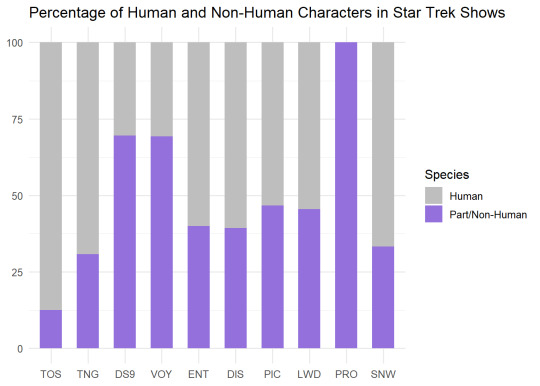
I was curious about which Star Trek shows had the most human vs non-human characters, so I made this graph. I counted all major characters plus characters who were in at least 10 episodes of each respective show (with a few exceptions for incredibly minor characters who are technically in more than ten episodes but have barely any/no lines). A full list of characters included is below the cut.
TOS:
Part/Non-Human: Spock
Human: Kirk, Mccoy, Scotty, Uhura, Sulu, Chekov, Chapel
TNG:
Part/Non-Human: Data, Troi, Worf, Guinan
Human: Picard, Riker, La Forge, Crusher, Wesley, Yar, Pulaski, O’Brien, Ogawa
DS9:
Part/Non-Human: Kira, Odo, Quark, Jadzia, Rom, Nog, Garak, Dukat, Worf, Weyoun, Martok, Leeta, Ezri, Damar, Female Changeling, Winn
Human: Sisko, Bashir, Jake, O’Brien, Keiko, Kasidy, Ross
VOY:
Part/Non-Human: Torres, Neelix, EMH, Tuvok, Kes, Seven (part Borg counts as not entirely human to me), Seska, Naomi, Icheb
Human: Janeway, Chakotay, Paris, Kim
ENT:
Part/Non-Human: T’Pol, Phlox, Soval, Shran
Human: Archer, Reed, Tucker, Sato, Mayweather, Forrest
DIS:
Part/Non-Human: Saru, Tyler (debatable but I’m counting him as partly non-human), L’Rell, Book, T’Rina, Nhan, Rillak, Linus, Zora, Adira (again, debatable, but they’ve got a symbiont so they’re not entirely human to me), Gray
Human: Burnham, Stamets (complicated case but I counted him as still human), Tilly, Culber, Lorca (mirror universe characters are still human, I think), Georgiou, Detmer, Owosekun, Rhys, Bryce, Cornwell, Airiam (she’s still human), Pike, Jett, Nilsson, Pollard, Vance
PIC:
Part/Non-Human: Picard (for part of the show at least), Elnor, Soji, Narek, Seven, Laris/Talinn (I am just pretending they’re the same character for simplicity), Jack (I guess???)
Human: Musiker, Jurati, Rios, Adam, Riker, Crusher, Shaw, Sidney
LWD:
Part/Non-Human: Tendi, Shaxs, T’Ana, Barnes, Kayshon
Human: Mariner, Boimler, Rutherford, Freeman, Ransom, Billups
PRO:
Part/Non-Human: Dal, Gwyn, Zero, Rok-Tahk, Jankom, Murf, Hologram Janeway, Diviner, Drednok
SNW:
Part/Non-Human: Spock, Una, Hemmer
Human: Pike, La’an, Uhura, Chapel, M’Benga, Ortegas
#star trek#star trek tos#star trek tng#star trek ds9#star trek voy#star trek enterprise#star trek discovery#star trek picard#star trek lower decks#star trek prodigy#star trek snw#lane posts#lane's misc meta
919 notes
·
View notes
Text
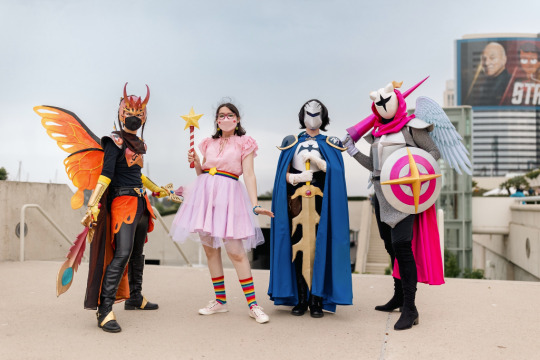
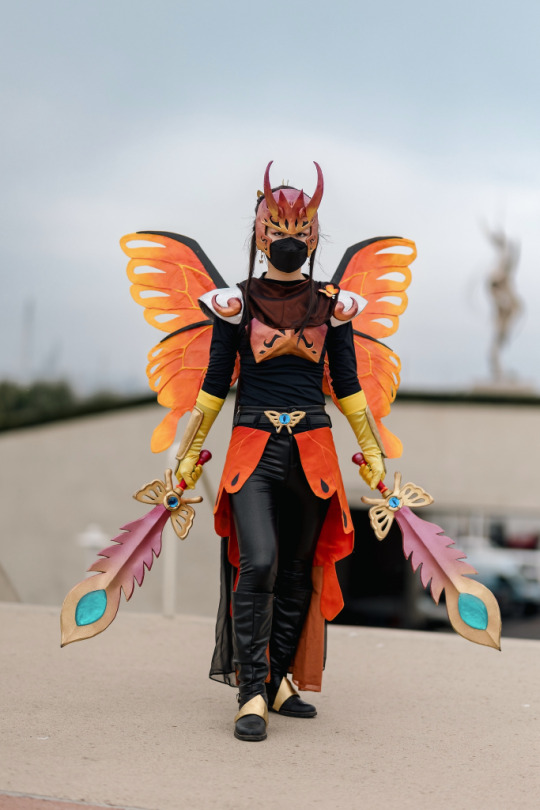
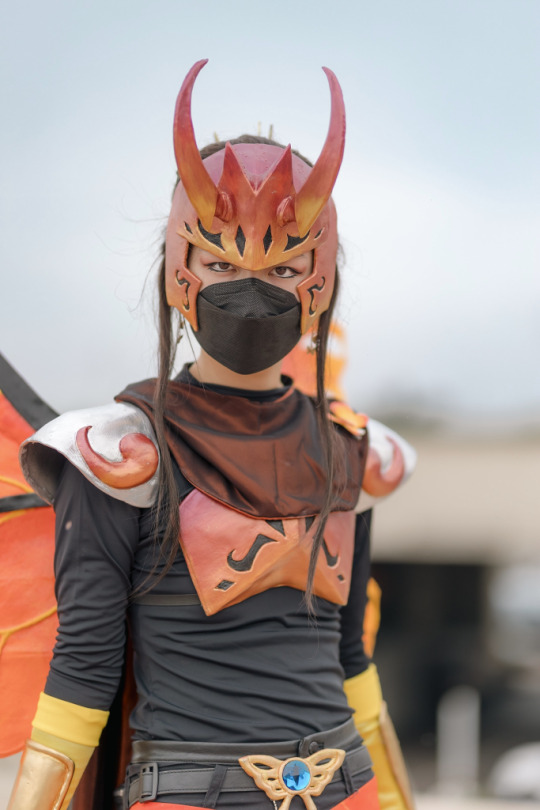

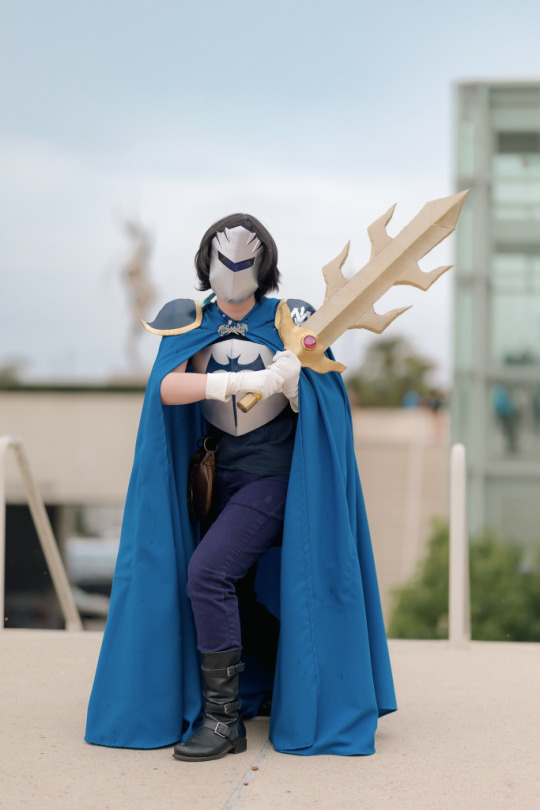


Four puffballs walk into a con...
comiccon_captures was kind enough to take some absolutely Stellar photos of our group last SDCC! The heat may have been killer but at least so were the fits!!
Morpho Knight: @aseuki || Kirby: @nymphofnovels || Meta Knight: @alagaesia-overlord || Galacta Knight: @humming-fly
Photography and Editing: comiccon_captures
#Featuring Cameo from the Captain Picard Himself Hello#Kirby cosplay#sdcc#morpho knight#kirby#meta knight#galacta knight#Cosplayseuki#<- new cosplay tag in case anyone's interested!!#or if anyone Isn't interested well. You know what tag is being used asdkfjn#yellings and vibrates and screams#these came out so so so good I'm?????#lays on the ground. Prints out the photos. Eats them#Gonna be Thinking about these pics for a long while askdfjsdfn
1K notes
·
View notes
Text
THERE MIGHT BE KAHLUA IN THAT NEBULA: A Star Trek Fandom Drinking Game
Booze: the final frontier. Fandom conventions: the final, final frontier, once you're past the original point of no return.
Whether you're cosplaying at a con, chillaxing on your couch, or doing a watch party online with your virtual shipmates - THESE ARE THE VOYAGES… of you, running frantically to the restroom, humbly bowing before the almighty porcelain god, and paying your penance to the Guardian of Foreverclear.
Your mission is to seek out strange new life by looking in the mirror because you, my friend, are a goddamn nerd who's been playing a Star Trek drinking game. And although you've probably been here MANY times before - if you can't remember it, we can just wink and say you're boldly going where no one has gone before.
ATTENTION BAJORAN TWERKERS: These are the rules.
1) Grab a cup, flask, bottle, mug, or biohazard container full of your favorite intoxicant (or juice or soda if you wanna play but don't do the booze thing. Hell, drink water if you want. Somebody's gotta stay sober to remind the drunk-ass fools of all the embarrassing shit they did in the morning.)
2) Plop your ass in front of a Trek episode if you're gonna do Part I, or go prowl a convention or fandom event if you're gonna do Part II. (If you're doing part II, disclaimer applies: please don't get caught if you break any convention policies related to alcohol.)
3) Drink as instructed. May the Force be with you and may the odds be ever in your flavor…er…favor, because you're gonna need the strength of a few other fandoms' catchphrases to get through all this goofy shit. (Seriously though, please DO make sure you live long and prosper. If you've hit your limit, switch to water.)
------ THIS GAME IS WRITTEN FOR ENTERTAINMENT PURPOSES ONLY. NO ONE IS ACTUALLY ENCOURAGED TO CHUG THEMSELVES INTO OBLIVION. VOID WHERE PROHIBITED BY LAW OR BY OUTLAWS ON FENRIS AND/OR FREECLOUD. THIS PAGE MAY NOT BE REDEEMED FOR CASH, CREDITS, DILITHIUM, OR LATINUM. IF YOU'RE STILL READING THIS CRAP, YOU MAY NOT BE REDEEMED EITHER. MANAGEMENT IS NOT RESPONSIBLE FOR ANY UNEXPECTED WORMHOLES, TRIBBLES, LIZARD BABIES, OR REGRETTABLE LIFE DECISIONS. -----
#star trek potluck#Star trek potluck 2024#startrekpotluck2024#Star trek memes#Star trek shitposting#Drinking game#Star trek voyager#Star trek picard#Star trek tng#star trek ds9#star trek prodigy#Star trek some other stuff I'm too incoherent to remember#Star trek Meta
35 notes
·
View notes
Text

#I'm calling it#Archer is a son of Zeus#Pike is a son of Apollo#Picard is a son of Athena#Janeway is a daughter of Hermes#Sisko is a son of Mars#And Kirk#obviously#we all know#Is a son of Aphrodite!#my meme#percy jackson memes#percy jackson#percy jackson meta#percy jackson and the olympians#captain archer#captain pike#captain kirk#captain picard#captain janeway#captain sisko#zeus pjo#apollo pjo#athena pjo#hermes pjo#mars pjo#aphrodite pjo#star trek#star trek memes#canonically thirsty kirk
28 notes
·
View notes
Text
One of RWBY's themes, especially in the later volumes, is how stifling and painful being expected to act perfect all the time really is.
So naturally, the fandom holds its characters to absolutely high standards and flip when they aren't 100% absolutely golden, or woobyfy them to such a degree that they can't see any of the flaws they're supposed to have.

53 notes
·
View notes
Text
Okay so, since 2009 most of Star Trek has had this swirly blue tunnel warp speed effect . . .

. . . seen here on the U.S.S. Titan in Picard season 3. Now, a few episodes later the gang pile into their old Next Gen ship and . . .

It's the 90's Trek "streaking stars" warp effect!
I always assumed it was just different visual effects for the exact same thing, a real-life artistic choice, and now I'm wondering if different ships with different engines are supposed to make different warp effects in-universe. Or maybe it's just nostalgia overload and I'm overthinking things as usual.
#star trek#picard spoilers#star trek picard#star trek meta#warp speed#star trek tech#uss titan#enterprise d#the next generation#star trek tng#deep lore
156 notes
·
View notes
Text
One of the weirdest things about NuTrek is that they seem to have forgotten that enlisted people exist in starfleet. Like everyone on those shows is an officer. Its like they can't conceive of anything existing below ensign.
27 notes
·
View notes
Text
If there's one thing Voyager is really good at -- is making TV movies aka their two-three parters (I consider Scorpion 1 and 2, and The Gift a trilogy).
But also, aside from Year of Hell, I think Dark Frontier is also a great TV movie-style event.
It might be the first time Seven actively denied she was Borg.
I know I've screencapped this scene before but I want to do it again because the scene is so good, so crunchy.
In the scene after the Borg Queen orders Seven to assist with the assimilation effort-- Seven kind of follows along in a daze, almost automatically goes along with things like a good drone:

It's only when Seven registers that people are yelling around her that she stops:
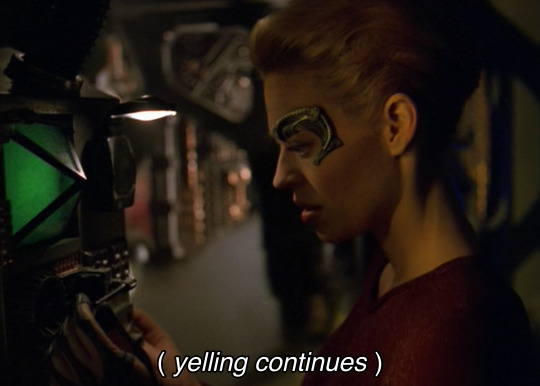
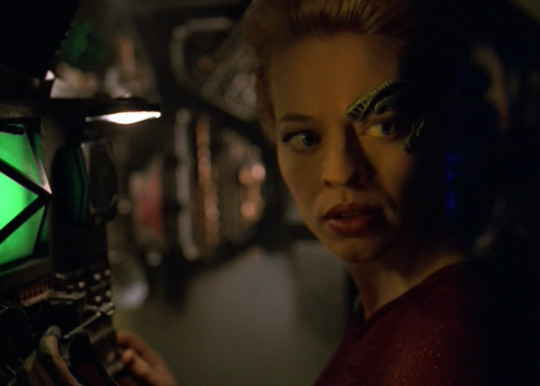
People yelling for mercy in a Borg Cube must have been background noise for Drone!Seven.
The moment that Seven post-severance realizes what the yelling actually means, Seven is perturbed. Especially when she can see people being ushered to their assimilation. Blank-faced and resigned to their fate:
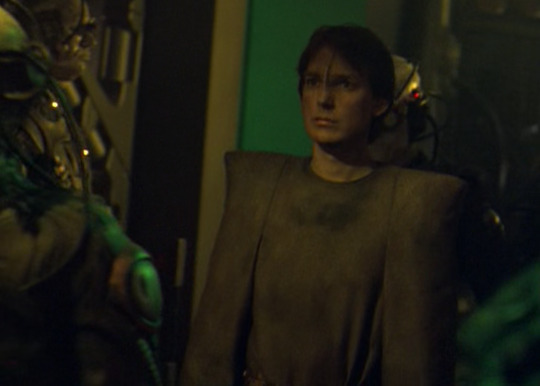
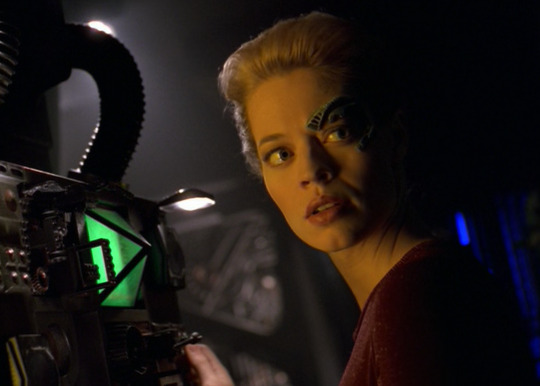
She looks haunted, but the explosions and sparks jostle Seven back to the efficient Drone mindset and she walks toward the malfunctioning area to try and fix it until she's thrown onto the floor. And healed in a very brusque manner by fellow drones, and you can see Seven's confused state. She doesn't know whether to be afraid or take it as given.
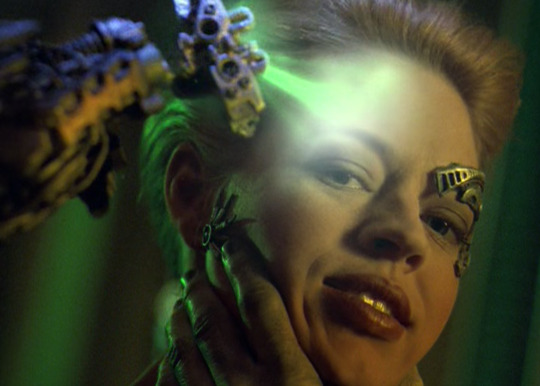
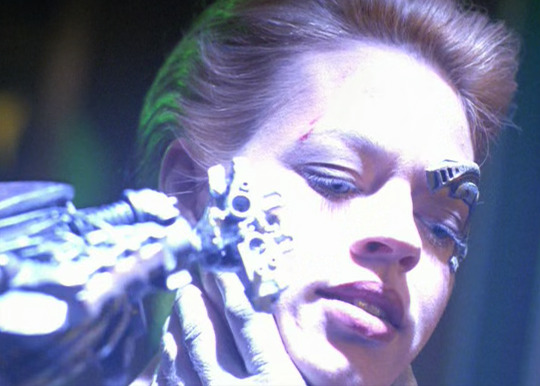
You can see Seven think: Oh. If I'm not critically injured, they heal me. But the experience clearly shook Seven and she stumbles back, and tries to go somewhere.
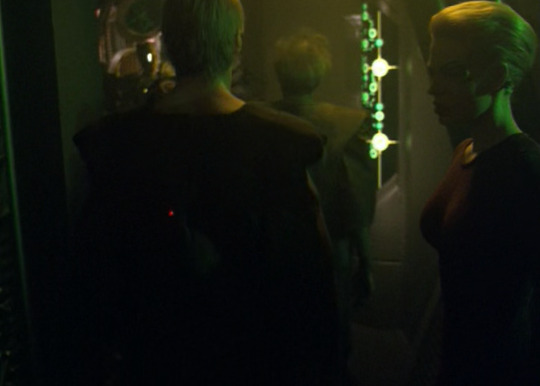
And runs right into another group of people forced to march to assimilation chambers.
One man, who has a little fight left in him tries to escape and runs right into Seven, who automatically, with her Borg-enhanced arm catches the man.

Even Seven seemed shocked at what she did.

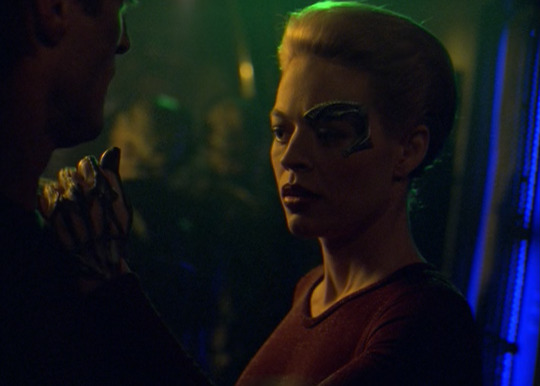
Seven releases the man:

Too late.
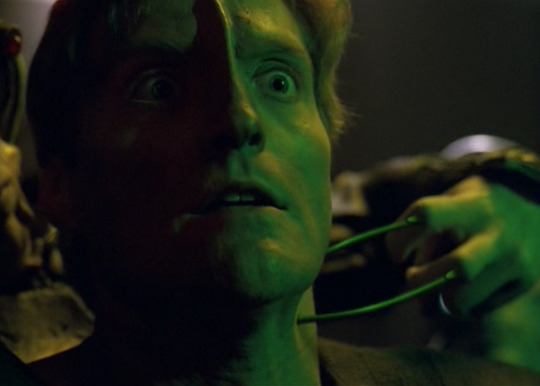
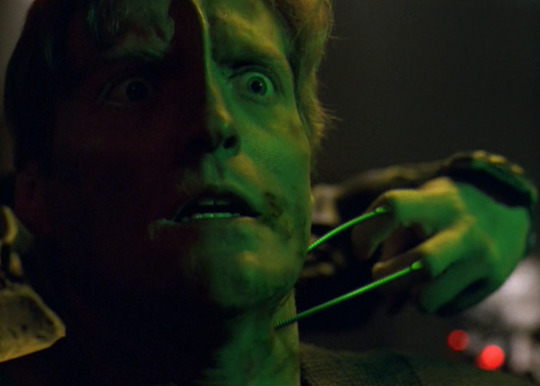
He's immediately injected with nanoprobes.
(Side note: I just realized this effect is very similar to the effect in Picard s3-- which makes sense because the Borg Queen's plans there were actually hatched partially in this two-parter!)

Seven is so horrified with what she's done, she staggers back. Again, a beautiful call forward to the moment Seven staggers back when alt!timeline!Borg Queen calls for her in Picard s2.
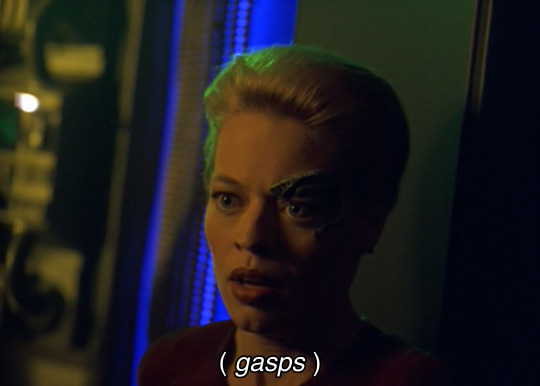
This is Seven's impetus in trying to help, if not all but at least someone.

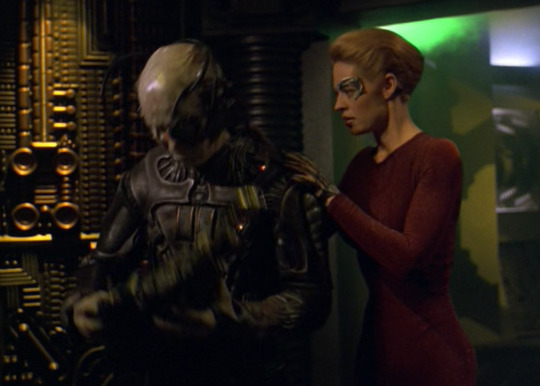
And the first time when Seven vehemently denied she was Borg:

Thus starts Seven lifelong struggle between her two identities- Borg and Human.
The questions about who she is is something that will plague Seven from the Delta Quadrant to the Alpha Quadrant. Picard s2 implied she was at peace with who she is but progress is not linear and I hope it's a question she's still struggling with (if we get her show).
#thinky thoughts#meta: voyager#star trek voyager#dark frontier#star trek picard#picard s3#seven of nine#the borg collective
36 notes
·
View notes
Text
Picard thoughts
The more times I watch Picard (all the seasons) the more I realize what an absolute fucking arsehole Picard became in his old age. In all possible ways. Arrogant, self-absorbed, self-righteous, emotionally stunted, dismissive of others, ready to sacrifice everyone else to fulfill his own needs. I really admire Patrick Stewart for being willing to take that on.
I mean, he was kind of an arse in TNG too, but it got so much worse.
6 notes
·
View notes
Text
As I scream into the void seeking a Narek RPer to play against, I have finally caved and must explain why I want this Romulan loungelizard to be more popular. (It won't happen, but I can dream.)
Reasons I like Narek as a character that nobody but me gives a shit about:
Let me preface this with a fact about me: I know Romulans.
I've RPed as Nero for almost two straight years in a large game. I've basically learned Rihannsu back to front for the endeavor. The person who played my Ayel and I both dumped countless hours into developing grammar and extrapolating cultural rules. We were dedicated to making them as believeable and accurate to canon as possible.
I have the whole timeline of the destruction of Hobus/Romulus down to memory. I know about all the neat little tidbits and trivia from comics and adjacent materials etc, etc.
This is to say: I have read and written quite a lot about Romulans in my time. I am very familiar with how they work and what data is available to draw from when writing them.
We do meet a few rank and file military Romulans from time to time, however. So we know how the general military operates in direct contrast to the Tal'Shiar. Caution and secrecy is sort of baked into their culture, which makes a lot of sense given that they're constantly at war with basically everyone, but they aren't (generally) unreasonable people.
In canon Trek, Romulans are often a little over the top with the sneaky-backstabbing-untrustworthy-nonsense. They're almost comical with how much scheming they do, but most of the Romulans we meet in canon are Tal'Shiar. The Tal'Shiar are known, pretty explicitly for the depth and breadth of their sneaky-backstabbing-untrustworthy-nonsense. It's kind of their whole deal, apart from mnhei'sahe (literally the ruling passion honor).
Narek, however, was a child when Hobus went supernova. He is from the very last generation that had any living memory of Romulus. (Elnor is also from this generation and they are great foils for each other, but that's another essay.) Narek is from a (presumably) respected family of--if not Tal'Shiar then Military--operatives. His aunt held high rank, his sister did as well, and both were inducted into the Zhat Vash, an organization that worked so quietly and efficiently that even the famously paranoid Tal'Shiar thought they were a myth. They orchestrated catastrophes and manipulated Galactic law to their ends, one of their members was the head of Starfleet Security and Narissa was on a personal basis with her.
Their underlying culture is present, but it isn't explored very deeply in any one canon source. Taken collectively, however, it is just as substantial as Klingon Battle-lust or Ferengi Capitalism.
Nero was a break from the norm, not because he was vengeful, but because he was the first non-military Romulan we'd ever really seen. His designs, the tattoos, the crew of his ship with their very un-Romulan loyalty, the way he talked and sought equivalent exchange of lives (mnhei'sahe), was a wealth of Romulan culture that we hadn't ever seen. He was a regular Joe, had a regular non-Military job, trusted and worked with aliens to try and save lives. His failure (not his fault) was something he absorbed and sought to rectify in the Romulan way.
Nero was super interesting both for how much detail he cast on Romulan culture, and in how he slotted into the Prime Timeline. Nero was a guy desperately clinging to hope, to the last vestiges of his civilian life, but he was cut free by the destruction of Romulus and set adrift. The only anchor he had in the AOS timeline was his honor and the driving need to balance the scales and restore it.
Narek, however privledge his family was, was a washout. He was a failure. We know he wasn't Zhat Vash, and whether he was even Tal'Shiar is up for some serious speculation. He doesn't act like military officers, and only seems to be play-acting as a Tal'Shiar, miming his sister when it suits him.
Narek may have had authority on the Artifact, but it was probably by dint of Oh granting it. We never get any clarification whatsoever about his rank or dayjob, just that he is fully devoted to helping the Zhat Vash. He is analytical, prepared, but he is not good at thinking on his feet and clearly does his planning off screen. He's meticulous but not especially skilled at hiding or regulating his emotional state. He is far less aggressive and stalwart than just about every other Romulan we've seen...except for Nero.
He was literally a placeholder sent to keep tabs on Soji. He didn't even arrive until Narissa had failed to capture Dahj. That Narek managed to get close to Soji, that he discovered her dreams and correctly surmised what they are, was more luck than skill. Before his assessments the Zhat Vash knew that Dahj (and Soji) could be activated out of their cover, but they assumed that they could capture them. They probably assumed they could torture the data out of them, if not dissect them and rip out a harddrive.
Narek found an easy way to get right to the information they needed. His attachment to Romulan culture is his puzzlebox--Before Nero we had never met a Romulan civilian and before Narek we have never met a cultural Romulan who plays with a toy, we had never seen a child's toy like that. Of course, the puzzlebox (Tan Zhekran) was a mechanism to illustrate his thought process, to make the differences between Narissa and him very apparent, but it was also something from his childhood (presumably). It's a weirdly personal affect for a Romulan and he fidgets with it almost constantly. It's a tell, something he shouldn't have, and it makes him accessible on an emotional level.
Narek is a civilian.
He's a civilian in a family of spies and operatives, raised alongside his sister on the same stories, with the same care. There's no way a Zhat Vash didn't have a family home on Romulus. While Elnor is a nice example of the new generation of Romulans, Narek is one of the last examples of what is used to mean to be a Romulan. He saw Romulus and escaped with all his surviving family when it as it was destroyed. Narek was raised on Romulan tradition (private names for family), Romulan stories about the end of the world, and he is haunted by them because he knows they're true, they're real. His sister and aunt have seen it, seen the message that drives people mad, about Ganmadan. His living relatives have dedicated their lives to preventing it and, even if he isn't actually Zhat Vash, he does the same.
Narek is a failure, by his culture's standards, by his family's standards, but he is also the only one of them who lives in the end.
He's a civilian who is trying, desperately, to avert another Romulan apocalypse. He has already lived through one and somehow this next one is even worse. Like Nero he sees the writing on the wall--but instead of doubling down on the traditional sneaky spy shit, he tries something new--unlike Nero, it works! He makes headway where nobody else could.
Unfortunately, it's kinda fucked up, but he then gives up everything in the pursuit of this goal. (Which to him, seems like a noble one.) Narek gives up who he is (by playing at being Tal Shiar), his safety (he has no idea what Soji is capable of or what might set her off, they only have records of Dahj killing a dozen agents before being blown up), and eventually resigns himself to killing the woman he's fallen in love with (the baseline requirement for giving out his real name). He does it all for the greater good, to save people and he doesn't seem to make much of a distinction between Romulan and other organic lives. He has his little plans, tracking La Sirena in a single cloaked ship, hiding his presence to tail them, firing on them despite being wholly outmatched, allying with Sutra however temporarily, trying to sway Soji again, turning to Rios, Raffi, and Elnor for help--he's willing to do anything because he's terrified that everything is about to end and it will be him who failed to prevent it.
The very last shot we see of him, after his plan to detonate the transmitter fails completely, is him on the ground being dragged away by the Coppelius androids. He doesn't posture or threaten, doesn't say ominous shit like the other Romulans we're used to--He begs. He claws at the ground, trying to stay, and he begs. He pleads with Soji, calls her his love, tries that last ditch hail mary because it's all he can do. He fails his task and she's the last person he can reach out to and, in the end, despite the very real threat to her life, Planet, and Picard, Soji smashes the transmitter. The apocalypse is averted.
Narek failed but he also succeeded. His aunt is dead, Oh has been outed as a traitor, and his sister is killed by Seven of Nine. In a cut scene, apparently, Narek was supposed to be arrested by Starfleet. So he's facing (at the very least) retribution from the androids and the ExBorg. Starfleet is very likely to arrest and interrogate him, if not imprison him indefinitely since he has ties to the Zhat Vash and, subsequently, will be on the hook to explain the Utopia Planetia disaster. Soji hates him, for good reason, and his homeworld is long gone. Narek has nothing...but the world was saved.
Narek is singular because he's all about needing and interacting with other people, he has no real authority, nobody he commands. He's a civilian (insofar as any Romulan can be) and is a soft, emotional boy who hangs on to his childhood toys. He's driven in equal parts by fear and a deep sense of failure, like everyone else in the show, and he takes the steps that seem right and necessary to him (also like everyone else on the show).
Narek was a great contrast against Elnor in every possible way--from his evasiveness to his fear of death--and he was a great foil for Soji. On Coppelius, Soji's terror clouds her judgment and she very nearly does terrible things to protect herself. Her actions, her opinions, her hesitation were all driven by fear. The ends seemed to justify the means. She reflects Narek's state for the whole show. Season 1 is about finding safety and meaning.
Narek is afraid for the whole duration of the show and his choices all reflect that same desperate need to find permanent safety, to live. Soji exists on the peripheral of that with the Ex-Borg, and as a synthetic, and then she falls headlong into it after his betrayal. Narek regrets trying to kill her and the symbolism of his losing that box, of him trying to kill her in a room that is so very culturally Romulan, right after telling her his name, makes it very clear that killing her is killing some piece of himself. But the ends justify the means. He can and will give up everything to save the world.
And his last line in the show is desperately pleading with the woman he loves as he's dragged away.
Then we never see him again or get anything resembling closure for Soji or Narek.
Which I will be big mad about forever, because they didn't even get the bare minimum acknowledgement and closure of "moving on and living life is paramount because it is finite and beautiful ". Nope. Nothing. I'm furious forever.
Thank you for coming to my TED talk. I hope if Star Trek Legacy happens we get Narek as a sort of...side character creeper informant ala Garak. I also hope we get Soji on Seven's Enterprise because I love her.
#Star Trek#Star trek picard#picard season 1#soji asha#soji#narek#elnor#picard#Nero (Star Trek)#AOS related musings#romulan star empire#romulans star trek#romulan#romulans#if anyone needs a full romulan dictionary hit me up#Mnhei'Sahe is the concept of honor tied to the foundations of yourself where 'failure' is akin to dishonor and righting the scales is#the number one priority regardless of what atrocities must be committed to accomplish it.#Nero was a failure and had to destroy Vulcan and Earth to equal the lives on Romulus - equivalent exchange#Narek is a failure who has no cultural capital to spend outside of his own life and safety and spends everything he has without hesitation.#Soji needs better taste in men but I still ship it#in this essay i will#Not rp#character meta#ooc post
21 notes
·
View notes
Text
The Celestialholz meta masterpost.
Hassius/Ephemeralartshipping
TM20 is gay.
TM20 is seriously gay actually...
Flapple? Even more gay than you thought.
The path to Artazon is suspiciously adorable...
There's 34 Surrendering Sunflora in Artazon. They're all gay.
The Harvest isn't any less gay, in case you were wondering...
Art class, in the art room. Because the art room's gay.
Hassius and the number two
Sun and moon men in a game not called Sun and Moon
Why is there a goddamn heart shape on the Sunflora Lawn, just why Game Freak
THAT ANIME EP THOUGH HUH
No hold up, Surrendering Sunflora wasn't quite gay enough
Hands up boys, we're in your walls
Motherfuckin' DIPPLIN.
Core-wyrms and fore-wyrms because why not am I right
So they have fields of apples now...
Shiny Dipplin is Hassel. I'm so done.
The saga of Hydrapple.
The bravest little Sunflora.
General Paldea
Larry's secretly a showman, the funky little businessman
Larry is a fucking gift to us all, and here's what's beneath the giftwrap
A small case of vanillacupcakes symbolism
The Treasures of Ruin are an AU Elite Four
Geeta's not evil, but if she ever heel-turns, here's why
Qcard
The heart, the brain and the saviour, or why Q is the sun
The doorway to meaning
What the fucking hell is this outfit are you kidding me Paramount
Ineffable Husbands
An alternative coffee theory, featuring the official colour of the universe
We need narrative balance, so Aziraphale's going to resurrect Crowley
Baldur's Gate 3
Let's have a chat about Durgetash and weapons.
The MCU
Deadpool and that one Star Trek scene

#ephemeralartshipping#hassius#hassel x brassius#hassel#brassius#pokemon scarlet and violet#larryposting#larry#katy#geeta#poppy#rika#q of the continuum#jean-luc picard#qcard#ineffable husbands#crowley#aziraphale#good omens#bg3#baldur's gate 3#so many metas! oh my god#sherlock holzmes 🤔
176 notes
·
View notes
Text
Seven of Nine’s journey through the cosmos isn’t just about exploring new worlds; it’s also about discovering her bisexuality, as seen in her heartfelt relationship with Raffi Musiker in "Star Trek: Picard." #BisLoveSciFi 🚀
#star trek#lgbt#queer#bisexuality#bi#lgbtq#lgbtqia#bi visibility#bi pride#representationmatters#bivisibility#sci fi#sci fi and fantasy#star trek picard#seven of nine#scifi#science fiction#outer space#star trek voyager#star trek meta#star trek fanart#star trek art#trek#star trek memes#bisexual
11 notes
·
View notes
Text
So the new Lower Decks episodes got me thinking about museums in the media, specifically - as museums as places of action. And about the very different ways museum ships were used in Lower Decks and Picard (the latter of which I still know only by osmosis - this summer hasn't been easy, and since I'm mostly planning to watch for analysis rather than enjoyment, Picard gets bumped down on my list fairly regularly, although I have seen clips from them arriving at the museum to get the Enterprise). This isn't going to be a full meta rn, because I have to run off to work fairly soon, just a few jotted-down thoughts so I remember later.
In Lower Decks, the museum ship is used for a small-stakes, interpersonal episode. There are quite a few little jokes about the museum life and preservation. And honestly, the moment when I absolutely cackled was the holoemitters and conservation efforts moment, because yes, you get it - a museum does not only preserve the objects themselves, it also needs to figure out how to disseminate the information to people effectively (also, conceptually, the Voyager museum is the absolute opposite of the Vasa museum, lol).
Like, the Picard museum is like the 19th century concept of museums. A collection of artifacts that are a testament to glory and power, and which are there to impress. If you've ever been to an old-time natural science museum, with their endless (very cool) rows of taxidermied animals that you can't touch (but are implied to be of Direct Scientific Value as research samples, even if they haven't been for like a hundred years), that's sort of what the vibe is like. The Lower Decks museum is a 21st century museum: smaller exhibition, a much more tightly-woven mesh of context, some emphasis on preservation (esp. by the curator), but also just as much on getting across what it was like. And, tellingly, Voyager is not used for a mission in the same way the Enterprise is, which strikes me as very important, but I'm still formulating in what exact way.
It's a really fascinating contrast between the shows and how they treat history. There's something to be said here for the two different approaches: historical objects can be directly useful in our life vs. historical objects are a part of our cultural DNA, metaphorically-speaking, but one cannot step into the same river twice.
#star trek lower decks#star trek lower decks spoilers#picard#museums#half-baked meta#yes this is about nostalgia again#and about museum discourse and preservation#very very interesting how it turned out
38 notes
·
View notes
Text
I saw a critique of Picard season three put forward as "a story about how only boomers can save the day from the bad thing," and... I can see it, I'm not saying that it's an invalid critique, but at the same time, I don't think it's altogether fair.
Like, for one, I feel like if there's any age-based or generational-base of the storytelling, it's in the realm of "being old does not mean you have nothing to contribute." Which is kind of a big deal when most of the time in media, you see Hollywood specifically trying to draw in and appeal to the demographics of youth, to hook them in and hold them for life. Meanwhile, Picard centered on a character in his nineties played by an actor in his eighties, and aside from Jack Crusher and Sidney La Forge, every major character and actor in the season was older than forty, at least, with the TNG cast all over sixty, with only two under seventy.
It's a pretty big deal, especially when you remember that the last time that Star Trek was directly addressing the aging of its cast, the characters involved were in the fifty/sixty range, and talking like they were near the end of their years of being able to contribute something, that they'd come to the end of their road and were just going to fade away soon after. So while the TNG characters weren't necessarily on the front line and acting as line officers, doing the day to day field work, they were also very clearly shown as being able to contribute to the world they lived in, being able to make the difference.
Plus the framing of Seven of Nine, I feel, makes a refutation of the idea as well - she is, despite being a returning character we the audience already knew, at the head of the "new generation," we see that throughout her framing, particularly in her relationship with Shaw. Not just with her advancement to captain, but also in particular in that last message from Shaw in the finale, where he acknowledges that he's representative of the old ways standing in her way and that if she's writing a new book, it's because the old one needs to be rewritten.
Now, maybe you could look at this in like a "boomers versus millennials/Gen Z" thing, but - and maybe it's just my general trend towards optimism, particularly in my Star Trek - but what I see is NOT generational conflict, but more of a call for generational UNITY. Y'know, the first half of the season, we saw how Sidney's faith and trust in Seven helped save the Titan, because she respected Seven to call her by her name, stopping the infiltrator. Although it was part of the Borg hijack, Jack's connected nature helped to save the day multiple times. And Seven also trusted that Picard and crew could do something against the Borg.
Hell, I could even take this further, and call this a metaphor AGAINST generational conflict, that it's saying that others will try to use generational differences to divide and disrupt, and we need to overcome that - this is something I KNOW I've seen talked about plenty on Tumblr, how we have all this stuff trying to pit millennials and Gen Z against one another, in the same way that millennials and the baby boomers are. That this is an effort by the forces of power (power that goes beyond generation) to keep the masses divided against one another so that they aren't a threat to that power structure.
Because sure, the Supercube and the Borg Queen were destroyed by the TNG crew flying in and saving the day, but Seven and company retook the Titan and held off the assault on Earth long enough that they could do that without Earth and the Federation falling, and a major point is that Jack had to CHOOSE to leave the Collective, that it had to be his decision. Everyone had to work together for that happy ending, rather than alone.
Maybe I am being overly optimistic and taking the best faith interpretation at the expense of something else being involved and at play... But then, isn't that something that Star Trek has always tried to ENCOURAGE, to believe the best in things?
73 notes
·
View notes